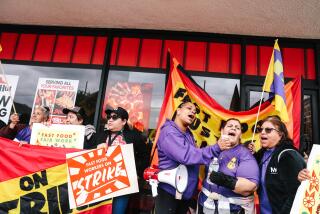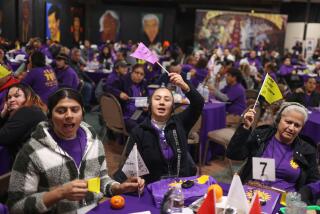Police Break Up Hunger Strike in Mexico
- Share via
MEXICO CITY — Hundreds of Mexican riot police broke up a hunger strike Sunday that has gripped the nation’s attention, and two protesters, near death after three months of fasting, were forced into a hospital.
Just hours after the two street sweepers, who have consumed little but water and glucose since Oct. 14, had declared that they would take their fast “to the death,” police launched a predawn raid on their makeshift camp, where nearly two dozen workers also were protesting. A third hunger striker was also taken to the hospital.
The protest, on behalf of 336 street cleaners laid off in 1995 by local authorities in the southeastern state of Tabasco, had cast a spotlight on miserable working conditions and joblessness in Mexico.
It was also a major embarrassment for President Ernesto Zedillo’s government. On Saturday, government-mediated talks to reinstate the street cleaners in Tabasco broke down.
The government said the hunger strikers and their colleagues pelted the authorities with sticks and pipes as police swept in Sunday. But representatives of the strikers said the police started the aggression, beating the street cleaners with batons.
In a statement, the Mexico City government said it had sought to end the hunger strike “for humanitarian reasons” because the lives of strikers were in danger.
But opposition politicians complained that hospital officials refused to give any detailed information on the three interned hunger strikers, beyond saying that two were in intensive care. The third was in less danger because he had been on a hunger strike for less time, authorities said.
The fate of the hunger strikers has deeply moved Mexicans, and doctors said the two who had been on strike the longest were likely to suffer permanent physical or mental damage from the ordeal. As recently as Saturday night, they had resisted efforts by their colleagues to hospitalize them.
More to Read
Sign up for Essential California
The most important California stories and recommendations in your inbox every morning.
You may occasionally receive promotional content from the Los Angeles Times.










